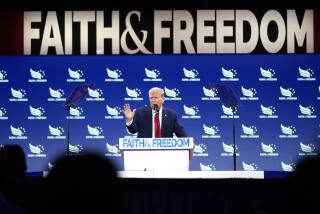Holy officeholders
Besides inspiring a brilliant parody, Mitt Romney’s something-for-almost-everyone speech last week about “Faith in America” offered a mini-lesson on an obscure provision of the U.S. Constitution.
“There are some,” Romney said, “who would have a presidential candidate describe and explain his church’s distinctive doctrines. To do so would enable the very religious test the founders prohibited in the Constitution.”
Never mind that in the speech Romney did describe and explain his religion, albeit indirectly, by avowing that as a Mormon “I believe that Jesus Christ is the son of God and the savior of mankind.” What was interesting was his implication that those who would ask a candidate to state his faith violate Article VI, Section 3 of the Constitution, which says that “no religious test shall ever be required as a qualification to any office or public trust under the United States.”
As a legal matter, Romney is wrong. The better interpretation of the “no religious test” language, which follows a requirement that public officials swear or affirm allegiance to the United States, is that it prevents officials from having to submit to something like England’s Corporation Act of 1661. That “test act” required elected officials to provide assurances that they had taken Holy Communion in the previous year according to the rites of the Church of England. This effectively barred Presbyterians and Roman Catholics (and Mormons, if there had been any at that time) from Parliament.
So Article VI, Section 3 isn’t binding on voters. A good thing, too, because most voters myself included would impose such a test in some circumstances. A candidate whose faith told him that Anglo-Saxons were God’s chosen race and that blacks were “mud people” wouldn’t get my vote regardless of how many Kennedyesque assurances he offered about his belief in the separation of church and state. Ditto for a candidate who believed that the Apocalypse would arrive before the expiration of his first term. Divinely inspired or not, such a view would tend to discourage the long view in budgetary policy.
A friend told me recently that she had settled on a litmus test for the 2008 presidential election. If a candidate believed in creationism, he or she was out. Since opposition to Darwin usually overlaps with adherence to a fundamentalist version of Christianity, my friend’s criterion is a de facto religious test. But so was my grandmother’s support in 1960 for “that dear Catholic young man,” John F. Kennedy. JFK passed her religious test, even if he wasn’t a good Catholic.
I don’t share Sen. John McCain’s preference that the president be a Christian. (To be fair, McCain later added that he would vote for a Muslim “if he or she was the candidate best able to lead the country and defend our political values.”) And I’m bemused by what is probably the most widely held religious test: the belief that a president must believe in God. According to a Gallup Poll taken earlier this year, a majority of Americans wouldn’t vote for a “generally well qualified” presidential candidate who was an atheist. That’s dumb.
In fact, most religious tests that voters might impose on presidential candidates strike me as stupid. But “most” doesn’t mean “all.” As Rudy Giuliani might put it, the reality is that most of us reserve the right to withhold our vote from a candidate whose religious beliefs, however sincerely held, make it likely that he would pursue what we consider bizarre public policies. Fortunately, the secret ballot means we don’t have to admit it when we violate Mitt Romney’s interpretation of “no religious test.”
Michael McGough is The Times’ senior editorial writer.
Send us your thoughts at [email protected].More to Read
A cure for the common opinion
Get thought-provoking perspectives with our weekly newsletter.
You may occasionally receive promotional content from the Los Angeles Times.











